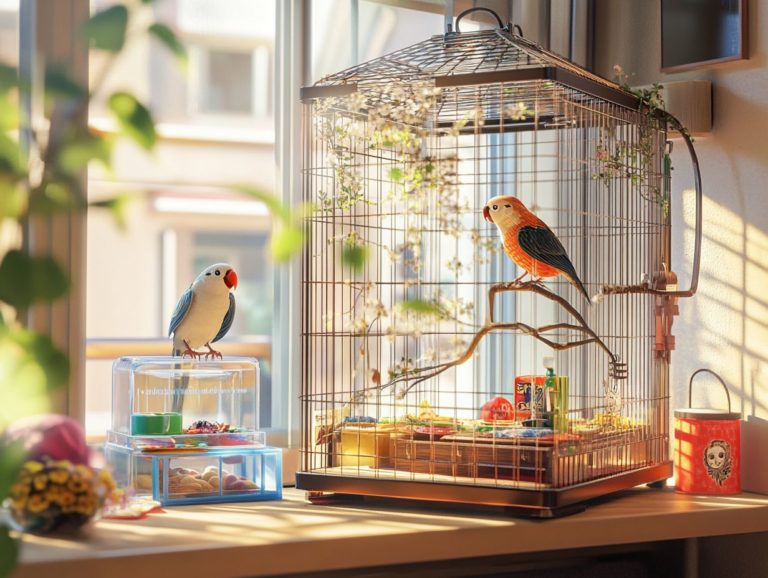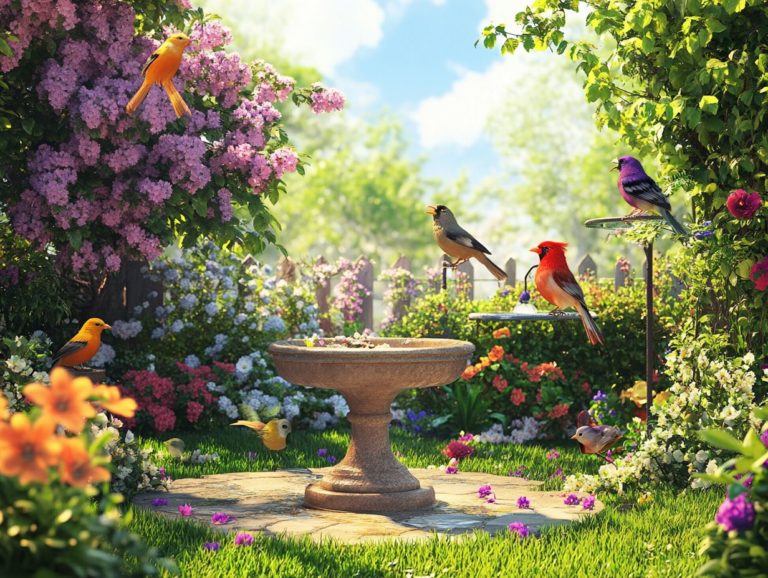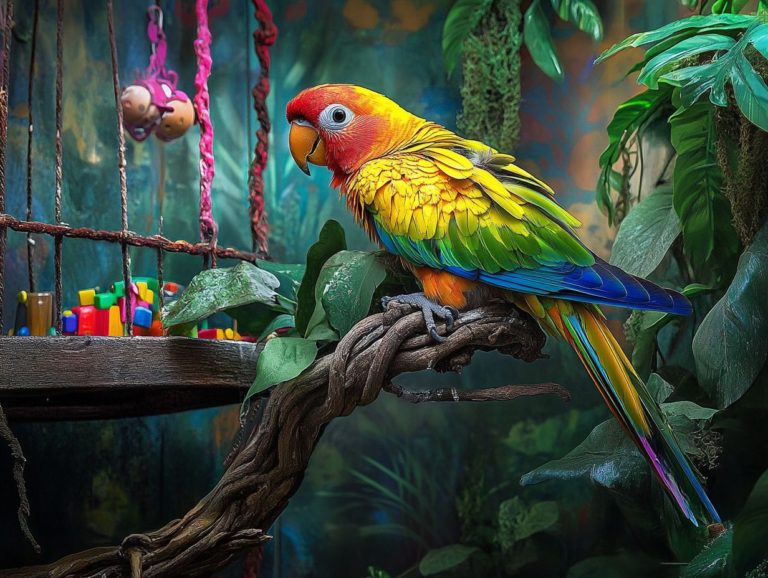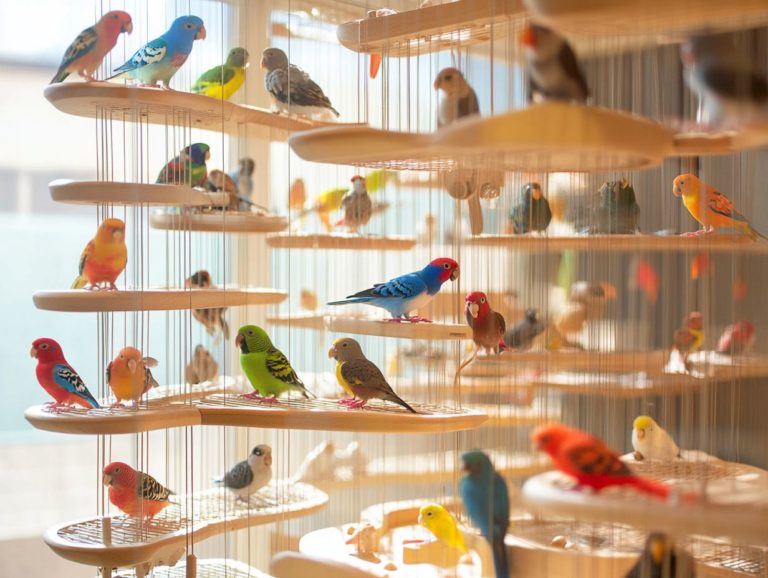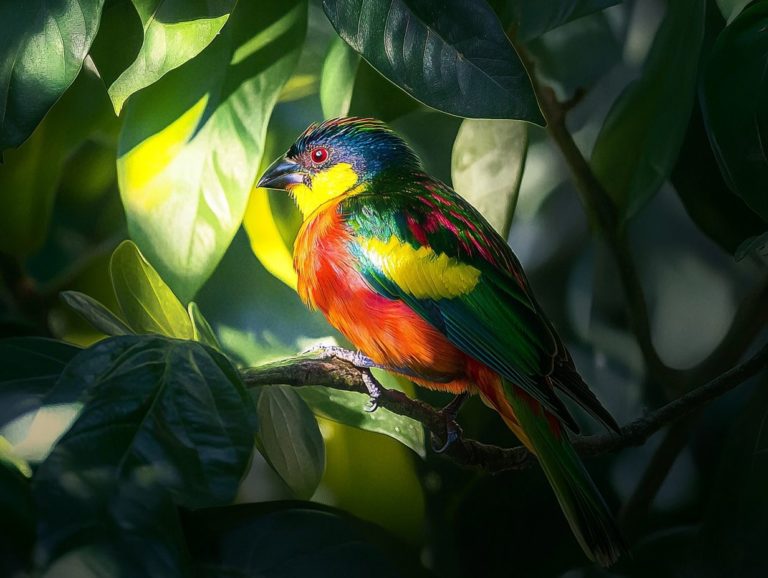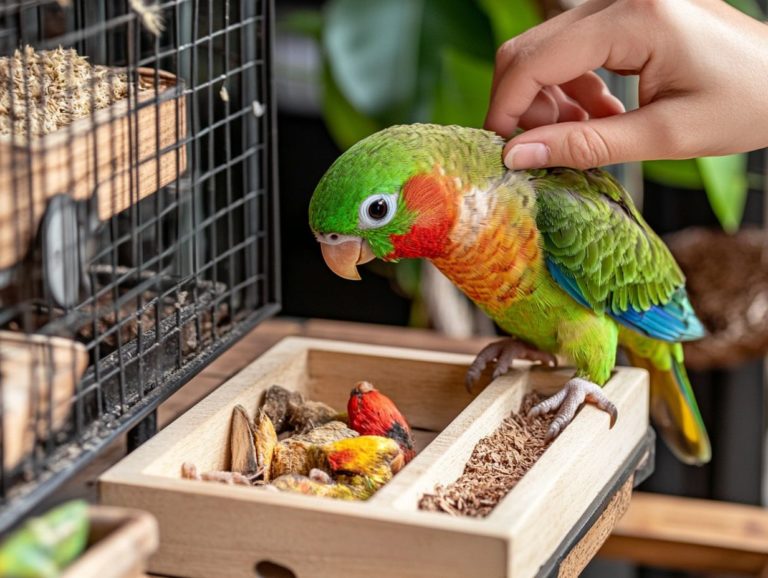How to Choose the Right Cage for Your Species
Choosing the right cage for your pet birds is essential for their health and happiness. With countless options at your fingertips, you must weigh several important factors like size, material, and accessibility to truly elevate your pet’s experience.
This article delves into the various types of cages tailored for different species, including birds, reptiles, and fish. You’ll also discover how to customize your pet’s environment to enhance comfort, along with practical tips for maintaining a clean and safe space.
Let us guide you in selecting the perfect cage for your furry, feathered, or scaly companion, ensuring their companionship and well-being!
Contents
- Key Takeaways:
- Factors to Consider When Choosing a Cage
- Common Cage Types for Different Species
- Customizing Your Cage for Your Pet’s Needs
- Tips for Maintaining and Cleaning Your Pet’s Cage
- Frequently Asked Questions
- What factors should I consider when choosing a cage for my pet?
- How do I determine the appropriate size for my pet’s cage?
- What type of material should the cage be made of?
- Are there any specific features I should look for in a cage for my pet?
- Can I use a second-hand cage for my pet?
- What should I do if my pet outgrows their current cage?
Key Takeaways:
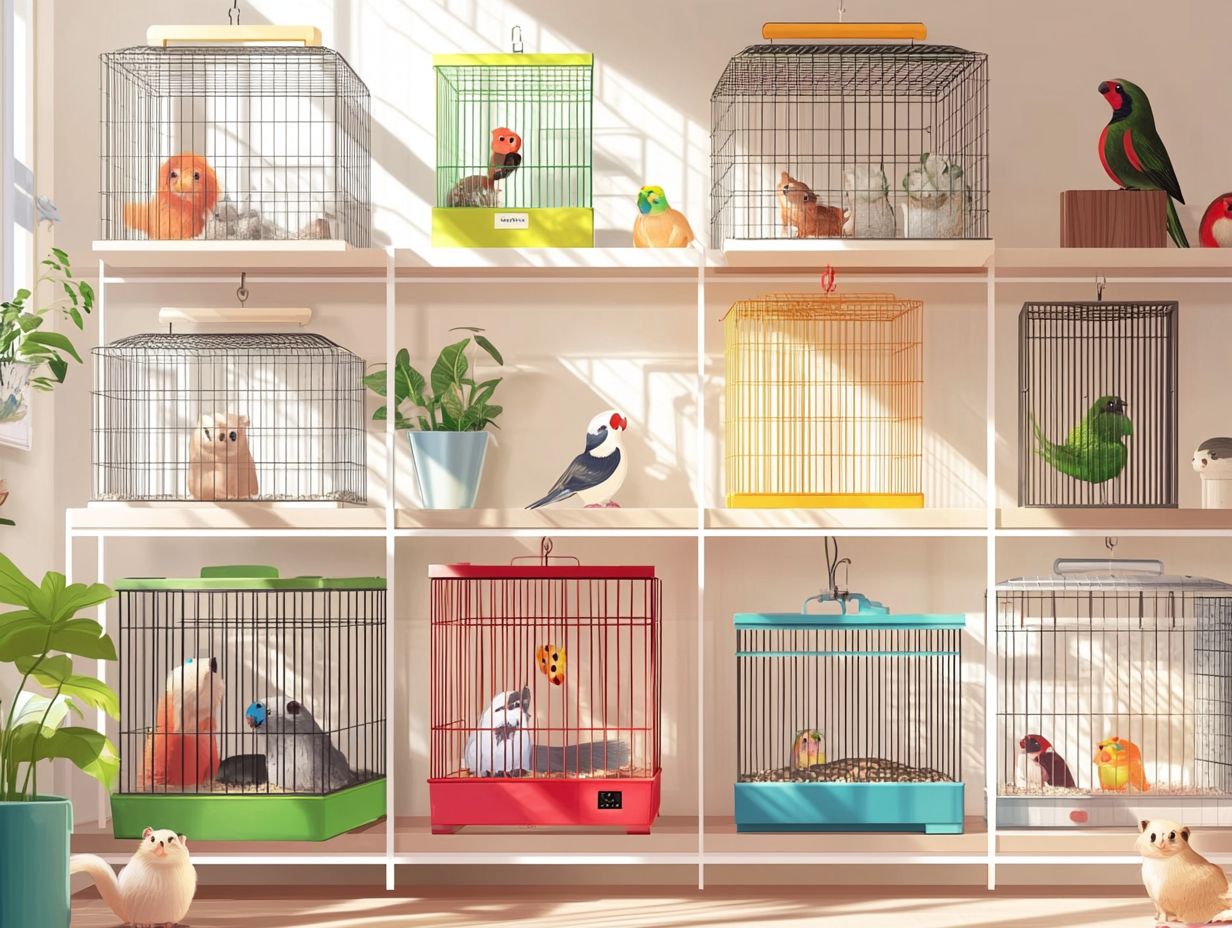
- Choose a spacious cage with durable materials and safety features.
- Select the right type of cage for your specific pet species.
- Enhance your pet’s cage with fun items and ensure regular cleaning.
Factors to Consider When Choosing a Cage
When you’re choosing the perfect cage for your pet birds be it macaws, budgies, or parrots it’s crucial to consider several factors that contribute to their health, comfort, and happiness. The right cage isn’t merely about space; it includes safety features and dimensions tailored to the unique needs of your pet birds.
By understanding their activity levels, behavior, and habitat preferences, you can create an environment where they truly thrive, making this choice an essential part of responsible pet ownership.
Size and Space Requirements
Understanding the size and space requirements for your pet birds is essential for ensuring their comfort and healthy activity levels within their cage, as well as their overall well-being.
Different species, like vibrant macaws, lively budgies, and colorful conures, have distinct needs regarding their living environments. For example, macaws thrive in larger aviaries that offer ample horizontal space for them to stretch their wings and explore. Budgies can manage in somewhat smaller spaces, provided there s enough room for exercise and social interaction with other birds.
The choice of perches plays a crucial role as well; thicker perches cater to the strong grip of a macaw, while budgies benefit from a variety of perch sizes to keep their feet healthy and engaged, enhancing their overall activity level.
By carefully considering these size comparisons among various cage models, you can make informed decisions that will significantly enhance the well-being, behavior, and happiness of your feathered companions.
Material and Durability
When selecting a cage, the material and durability are critical as they directly influence the safety and well-being of your pet birds, ensuring proper habitat conditions.
Weigh your options carefully, particularly the pros and cons of stainless steel versus galvanized metal, while keeping in mind the importance of non-toxic materials. Stainless steel cages are renowned for their non-toxic properties and exceptional resistance to rust, making them an excellent choice for long-term use in creating a safe habitat. On the other hand, while galvanized cages may boast durability, there can be concerns regarding harmful coatings that compromise safety features.
It’s vital to prioritize non-toxic materials to ensure a safe environment for your feathered friends, especially for their health and comfort. Investing in long-lasting cages not only saves you money in the long run but also creates a stable habitat where your birds can thrive and enjoy their surroundings without jeopardizing their health and exercise needs.
Start your journey to finding the perfect cage today your feathered friends will thank you!
Accessibility and Cleaning
When selecting a cage for your pet birds, such as cockatiels and finches, it s crucial to prioritize accessibility and ease of cleaning. This ensures both their comfort and your convenience.
These factors are essential not only for routine maintenance but also for cultivating a healthy living environment for your birds, enhancing their overall activity level.
A well-designed cage should include a bottom grate that effectively manages waste, preventing the buildup of harmful bacteria and unpleasant odors. This contributes to home safety.
This grate not only streamlines the cleaning process but also upholds hygiene, which is vital for your pet birds’ overall well-being.
Accessibility for feeding and interaction matters too. It allows you to easily engage with your pet birds while ensuring they receive their meals stress-free, enhancing their companionship.
Proper ventilation is also important, promoting air circulation and maintaining an optimal temperature inside the cage. This further enhances a healthier habitat for your birds.
These features create a lively and nurturing space where your birds can truly thrive!
Common Cage Types for Different Species
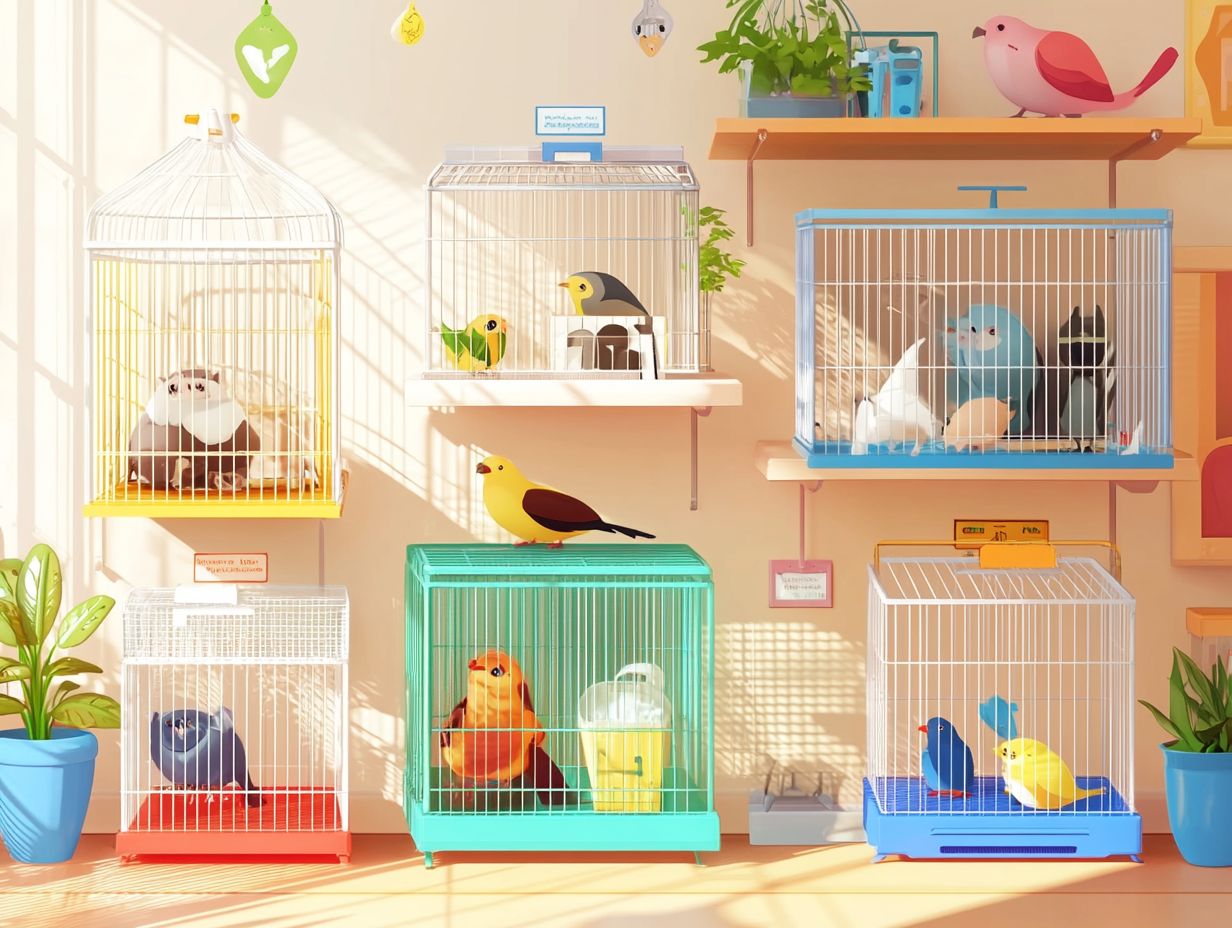
Choosing the right cage type is essential for the well-being of your pet birds, whether they are pigeons, doves, finches, cockatiels, conures, or lovebirds. Each species comes with its own unique requirements for habitat and care.
By selecting an appropriate cage design, you can ensure that their specific needs are met. This will help them thrive in their environment, enhancing their behavior and activity levels.
Bird Cages
Bird cages are meticulously crafted to meet the varied needs of different avian species, such as parrots, macaws, and budgies. They ensure birds enjoy adequate activity levels and comfort for a fulfilling life.
These cages come in a range of sizes, shapes, and designs, tailored to accommodate the unique characteristics and dimensions of each bird.
For example, larger birds like macaws thrive in spacious aviaries that offer plenty of room for flight and exploration. Smaller species, such as budgies and cockatiels, benefit from cozy yet enriched habitats.
Many bird cages are equipped with multiple perches made from different materials and set at varying heights. These features encourage physical activity and promote natural behaviors like climbing, playing, and social interaction.
By incorporating these thoughtful features, the environment becomes not only more stimulating for the birds but also enhances their overall well-being. This ensures they receive the exercise and mental engagement essential for their flourishing and health.
Small Animal Cages
Small animal cages provide ideal habitats for your smaller pets, such as guinea pigs and hamsters. They ensure these pets have the comfort and maintenance features essential for their well-being.
You ll find a wide range of designs tailored to meet the unique needs of various animals, from hamsters and guinea pigs to rabbits. These designs prioritize safety and comfort.
Wire cages are favored for their visibility and ventilation, while plastic enclosures make cleaning a breeze and offer enhanced security for your pets.
Some models even include thoughtful amenities like platforms, tunnels, and hideaways. These enrich your pet’s living experience and make them feel safe, engaged, and comfortable.
Maintenance is a cinch with many modern cages. They boast features like removable trays and washable materials that keep the environment hygienic and promote home safety.
Ultimately, selecting the right cage is crucial. It significantly impacts your pet birds’ comfort and your own convenience as a dedicated owner. Wondering how to find the perfect cage for your feathered friend? Let s dive in!
Reptile Cages
Reptile cages are meticulously crafted to replicate the natural habitats of these remarkable creatures. They ensure ample ventilation and space to thrive in a safe environment.
These enclosures come equipped with essential features like humidity control, UVB lighting, and different areas that have varying temperatures. All of these factors are vital for maintaining the health and well-being of your reptiles. Proper ventilation is crucial. It prevents harmful bacteria buildup and allows fresh air to circulate freely, creating a welcoming space for your reptiles.
A thoughtfully designed habitat simulation includes appropriate material at the bottom of the cage, climbing structures, and hiding spots. These features enable your reptiles to engage in their natural behaviors and thrive. By mimicking various environmental conditions such as temperature and humidity levels tailored to different species these specialized cages foster a stress-free living space that supports the overall growth, vitality, and health of these fascinating animals.
Fish Tanks and Aquariums
Fish tanks and aquariums are essential for crafting the perfect habitat for your aquatic pets, such as goldfish and bettas. They are meticulously tailored to meet their unique maintenance and water quality needs.
With a stunning array of options available from small desktop setups to expansive wall-sized displays you can select the ideal size that complements your space and lifestyle. Your design choices are vast, ranging from sleek modern aesthetics to charming rustic setups. Each can elevate the visual appeal of any room while ensuring the safety of your aquatic pets.
Maintaining optimal water quality is absolutely crucial for the well-being of your aquatic life. Fluctuations can lead to stress or illness. Understanding the balance of filtration, temperature, and pH levels is key to creating a thriving environment for your aquatic pets. By paying attention to these factors, you ensure that your fish and other water-dwelling organisms can flourish in their thoughtfully crafted homes.
Customizing Your Cage for Your Pet’s Needs
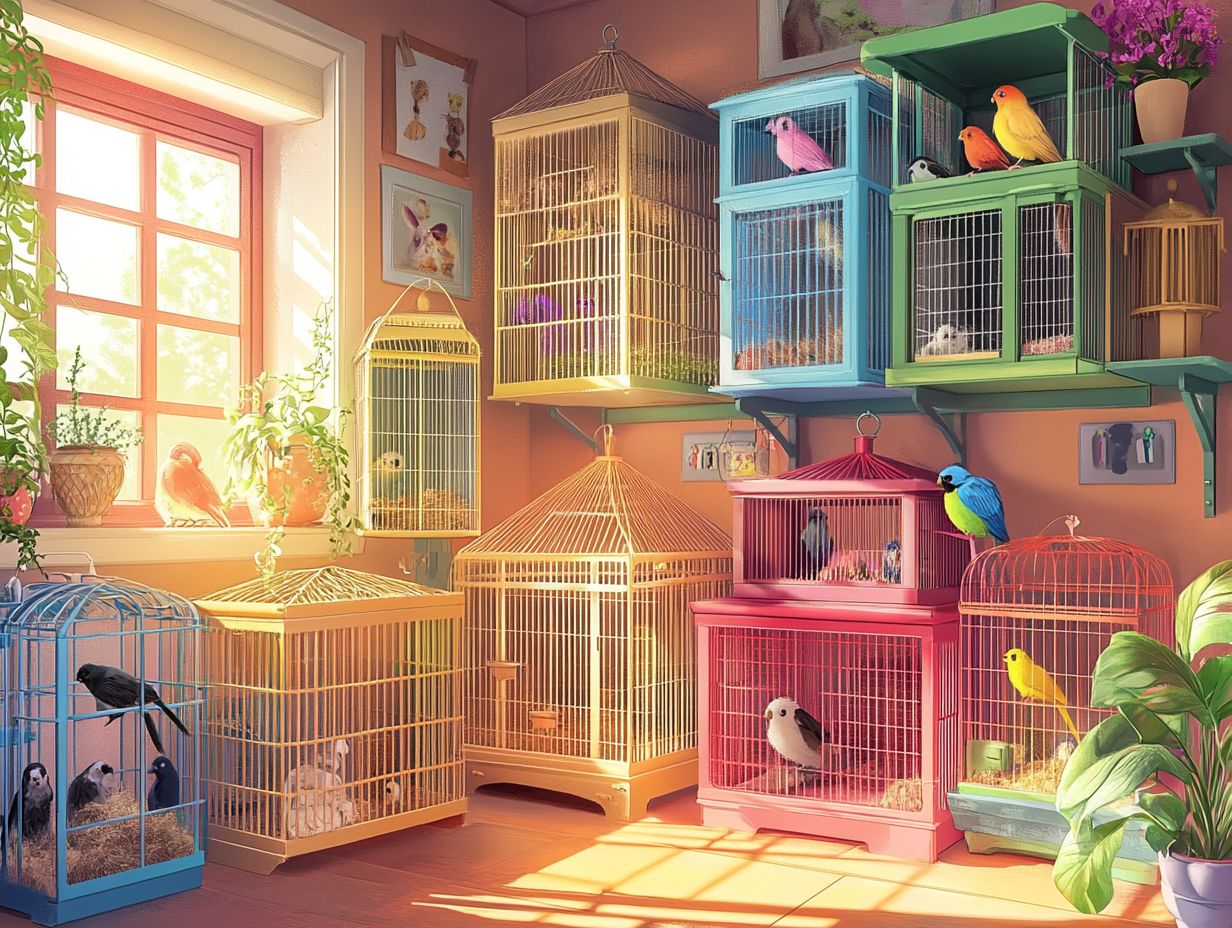
Customizing your pet’s cage can be thrilling! It’s your chance to create a lively environment that your birds will love. Tailor the cage to their needs and preferences. This includes considering their activity levels and social interactions to enhance their well-being.
Adding Enrichment and Accessories
Enhancing your pet birds’ cage experience with enrichment and accessories, such as toys, perches, and playstands, significantly elevates their comfort and interaction levels. These additions ensure they receive adequate companionship.
Incorporate various elements like climbing structures, swings, and interactive feeders to transform their environment into a stimulating haven. This encourages the natural behaviors of these lively companions. Not only does this prevent boredom, but it also promotes essential physical activity for their overall health.
Engaging toys can ignite their curiosity and challenge their mental sharpness, fostering a spirit of exploration. Perches with diverse shapes and sizes play a vital role in their well-being. They offer safe and comfortable resting spots, allowing them to stretch their wings while feeling secure in their surroundings.
Creating a Safe and Comfortable Environment
Your pet bird deserves a safe and comfy space. Add safety features to keep them happy and protected.
When designing their habitat, it s crucial to consider features like airflow and easy access. These factors play vital roles in promoting a healthy atmosphere. Adequate airflow keeps the space fresh and helps prevent respiratory issues. Ensure easy access for you and your bird to foster interaction and maintenance.
Carefully selecting materials and layout enhances security, minimizing the risk of escape or injury. Thoughtful design elements significantly contribute to a supportive space, allowing your bird to thrive and express its natural behaviors.
Tips for Maintaining and Cleaning Your Pet’s Cage
Maintaining and cleaning your pet bird’s cage is essential for creating a hygienic habitat. This attention to detail directly influences their health and overall well-being, ensuring they thrive in a clean and comfortable environment.
Regular Cleaning and Maintenance
Regular cleaning and maintenance are essential for keeping your pet’s cage in top-notch condition. Establish a consistent cleaning schedule that includes daily, weekly, and monthly tasks. Your daily routine might involve spot-cleaning droppings and refreshing food and water supplies.
On a weekly basis, tackle a more thorough wipe-down of the cage surfaces, perches, and toys using bird-safe disinfectants, which are cleaners that are safe for birds and won’t harm their health.
Each month, conduct a deep clean of the entire cage, changing bedding materials and scrubbing all accessories meticulously. Always opt for non-toxic, pet-safe cleaning products, as your birds respiratory systems are particularly sensitive.
By prioritizing these efforts, you can cultivate a clean and safe environment that supports the well-being of your avian companions.
Preventing and Treating Pest Infestations
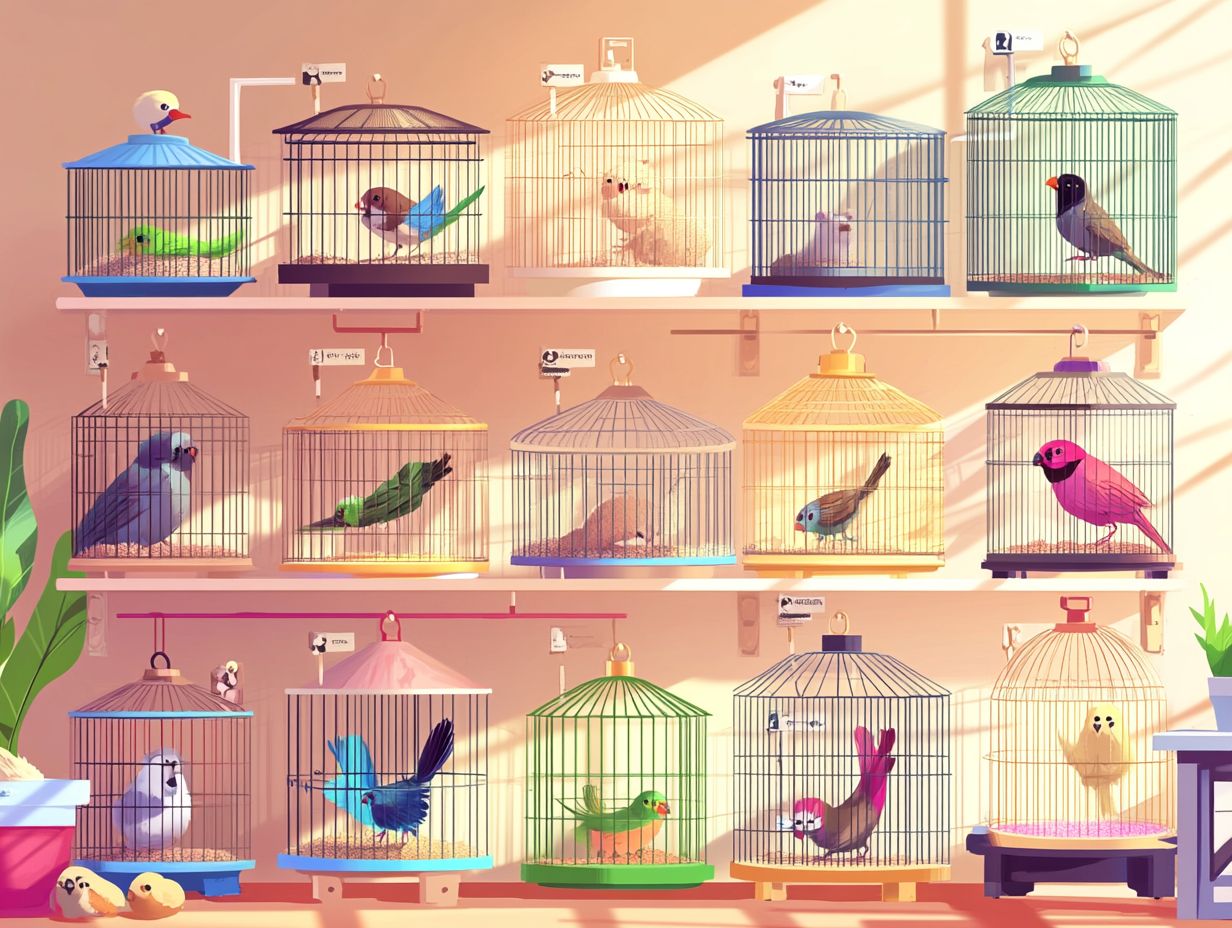
Preventing and treating pest infestations in your pet bird’s cage is crucial for maintaining a healthy and hygienic environment.
By adopting rigorous cleaning routines and effective habitat management, you can significantly reduce the risk of unwelcome visitors. Regularly removing droppings, uneaten food, and nesting materials keeps the cage tidy and eliminates potential breeding grounds for pests.
Ensure the cage is located in a moisture-free area and provides proper ventilation to discourage infestations. Don’t forget to add natural pest deterrents like certain aromatic plants to keep your bird’s habitat safe!
Frequently Asked Questions
What factors should I consider when choosing a cage for my pet?
When choosing a cage for your pet, consider the size, material, and specific needs of your species. The cage should be large enough for your pet to move around comfortably and made of a suitable material that is safe for your pet. Additionally, refer to this guide on how to choose the right location for a cage, as some species may require specific features such as climbing opportunities or hiding spaces.
How do I determine the appropriate size for my pet’s cage?
The cage should be at least three times your pet’s length for free movement. It s also important to consider the height and width to ensure enough space for your pet’s natural behaviors, such as climbing and flying. Consult with a veterinarian or research the specific needs of your pet’s species to determine the ideal cage size.
What type of material should the cage be made of?
The material of the cage should be non-toxic and safe for your pet. Wire cages are suitable for most small animals, while larger animals may need a sturdier material such as wood or glass. Avoid using plastic cages as they can be easily chewed and may cause harm to your pet.
Are there any specific features I should look for in a cage for my pet?
Yes, certain species require specific features in their cage. For example, birds need perches and toys to keep them entertained.
Rodents, on the other hand, need hiding spaces and platforms for climbing. Research the specific needs of your pet s species to ensure the cage has the right features.
Can I use a second-hand cage for my pet?
Avoid using a second-hand cage for your pet. It may have harmful chemicals or parasites left by the previous occupant.
It s best to purchase a new cage designed specifically for your pet s species to ensure their safety and well-being.
What should I do if my pet outgrows their current cage?
Act quickly! If your pet outgrows their cage, upgrade to a larger one immediately.
This will give them enough space to move around freely. Also, consider the species needs, as some may require additional features in their new cage.
Consult with a veterinarian or research appropriate cage sizes for your pet.

